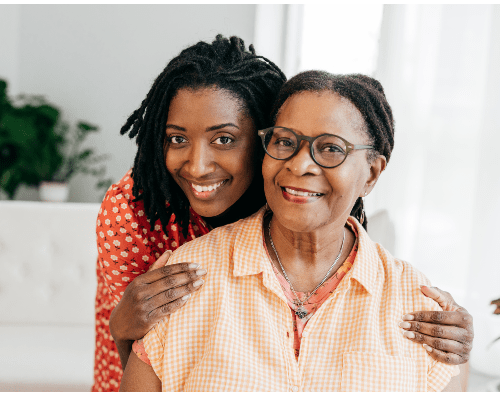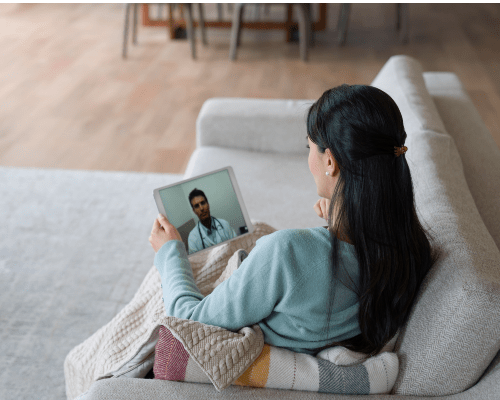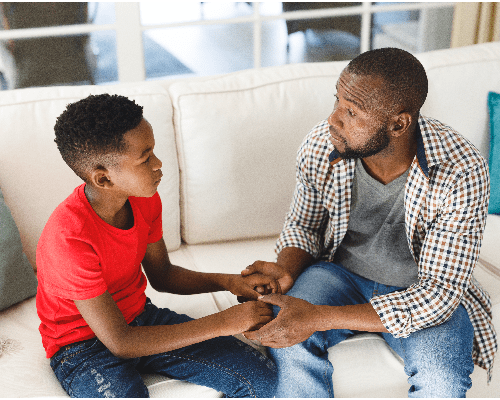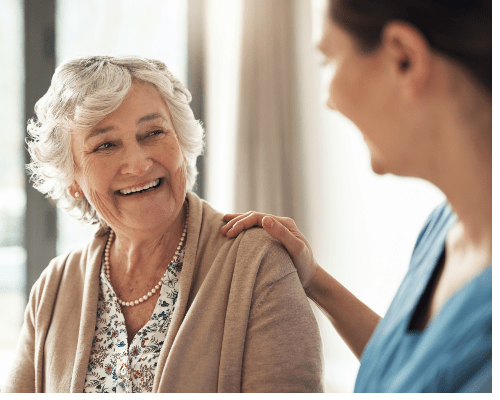Caregiver Resources
Comfort, guidance, and support for the journey aheadJoin us November 18, 2025 from 1:00-3:00 p.m. at the Riverside Cancer Care Center in Newport News. This event is free and open to the public.
The early days
Many people who become cancer caregivers take on the role because they are close to the person with the diagnosis, but that doesn't mean they are familiar with caregiving skills. The combination of unfamiliarity with caregiving, stress, concern about your loved one and a sudden change in responsibilities can affect every aspect of your life. If you’re wondering what to do first, here are a few grounding steps:
Try to attend the first oncology appointment if you can. Being there helps you understand the care plan and hear directly from the care team. Bring a notebook or use your phone to jot down questions—both yours and your loved one’s—as they come up. It’s also a good time to start a care folder, either on paper or digitally, where you can keep track of paperwork, contacts, and key dates.
If you’re juggling work, talk with your employer early. Ask about options for a flexible schedule or family leave. Many caregivers are surprised to learn that they qualify for time off or remote work options under federal policies like the Family and Medical Leave Act (FMLA).
Above all, give yourself permission to breathe.
Supporting loved ones
Cancer care isn’t just about medicine—it’s about the day-to-day moments of showing up. And while each person is different, here are some ways you might be able to help:
At medical appointments, your presence can offer reassurance. Being a second set of ears, helping them prepare questions, or simply sitting beside them in the waiting room can mean more than you realize.
At home, even small gestures make a difference. You might prepare meals, help organize medications, or just create a comfortable, quiet space where they can rest and recover.
Emotionally, perhaps the most important thing you can do is listen. Your loved one may not always want advice—they may just want to feel heard. Create space for honest conversation, allow moments of silence, and remind them often that they’re not in this alone.
What they are experiencing
Cancer treatment can take a toll in many ways—physically, mentally, and emotionally. Your loved one may experience fatigue, loss of appetite, discomfort, or emotional swings. Some days will be harder than others.
It helps to remember that these side effects aren’t personal. Your patience and understanding, especially on the tough days, are part of the care you’re giving.
And when they’re ready, help them find joy in small things again—a favorite book, a walk outside, a shared meal. These moments matter.
Caregiver well-being
This journey is hard—but you're not walking it alone. Every meal you cook, every ride you give, every moment you simply sit and hold space—those are acts of care that matter more than words can say. You are part of your loved one’s healing. And you deserve support, too.
Small acts of self-care make a difference when you are a caregiver. Here are 10 ways to care for yourself during this time:
- Go for a walk or stretch outside
- Have lunch with a friend
- Watch a funny movie or read a good book
- Enjoy a warm bath
- Listen to music or relax with a meditation app
- Attend a support group
- Take five minutes to breathe or meditate
- Talk with a mental health professional
- Accept those kind offers from friends and neighbors who volunteer to help
- Consider respite care – temporary relief from your caregiving duties
Practical support
Even if you're managing well, consider accepting help where you can. A few simple adjustments can go a long way in relieving daily stress. You might explore:
- Grocery or meal delivery services
- In-home care for your loved one
- A care calendar shared with friends or family
- Laundry or housecleaning services
- Transportation assistance to appointments
- Keep a running list of tasks people can help with. That way, when someone says, “Let me know if I can help,” you’ll be ready.
Many people who become cancer caregivers take on the role because they are close to the person with the diagnosis, but that doesn't mean they are familiar with caregiving skills. The combination of unfamiliarity with caregiving, stress, concern about your loved one and a sudden change in responsibilities can affect every aspect of your life. If you’re wondering what to do first, here are a few grounding steps:
Try to attend the first oncology appointment if you can. Being there helps you understand the care plan and hear directly from the care team. Bring a notebook or use your phone to jot down questions—both yours and your loved one’s—as they come up. It’s also a good time to start a care folder, either on paper or digitally, where you can keep track of paperwork, contacts, and key dates.
If you’re juggling work, talk with your employer early. Ask about options for a flexible schedule or family leave. Many caregivers are surprised to learn that they qualify for time off or remote work options under federal policies like the Family and Medical Leave Act (FMLA).
Above all, give yourself permission to breathe.
Cancer care isn’t just about medicine—it’s about the day-to-day moments of showing up. And while each person is different, here are some ways you might be able to help:
At medical appointments, your presence can offer reassurance. Being a second set of ears, helping them prepare questions, or simply sitting beside them in the waiting room can mean more than you realize.
At home, even small gestures make a difference. You might prepare meals, help organize medications, or just create a comfortable, quiet space where they can rest and recover.
Emotionally, perhaps the most important thing you can do is listen. Your loved one may not always want advice—they may just want to feel heard. Create space for honest conversation, allow moments of silence, and remind them often that they’re not in this alone.
Cancer treatment can take a toll in many ways—physically, mentally, and emotionally. Your loved one may experience fatigue, loss of appetite, discomfort, or emotional swings. Some days will be harder than others.
It helps to remember that these side effects aren’t personal. Your patience and understanding, especially on the tough days, are part of the care you’re giving.
And when they’re ready, help them find joy in small things again—a favorite book, a walk outside, a shared meal. These moments matter.
This journey is hard—but you're not walking it alone. Every meal you cook, every ride you give, every moment you simply sit and hold space—those are acts of care that matter more than words can say. You are part of your loved one’s healing. And you deserve support, too.
Small acts of self-care make a difference when you are a caregiver. Here are 10 ways to care for yourself during this time:
- Go for a walk or stretch outside
- Have lunch with a friend
- Watch a funny movie or read a good book
- Enjoy a warm bath
- Listen to music or relax with a meditation app
- Attend a support group
- Take five minutes to breathe or meditate
- Talk with a mental health professional
- Accept those kind offers from friends and neighbors who volunteer to help
- Consider respite care – temporary relief from your caregiving duties
Even if you're managing well, consider accepting help where you can. A few simple adjustments can go a long way in relieving daily stress. You might explore:
- Grocery or meal delivery services
- In-home care for your loved one
- A care calendar shared with friends or family
- Laundry or housecleaning services
- Transportation assistance to appointments
- Keep a running list of tasks people can help with. That way, when someone says, “Let me know if I can help,” you’ll be ready.

Palliative care supports patients and caregivers
Palliative care focuses on symptom management, emotional and spiritual support, and improving quality of life for patients and families alike. When palliative care is involved early, families report less stress, fewer emergency room visits, and more support through the ups and downs of treatment.
Learn about Riverside’s Palliative Care services
Staying healthy and emotionally supported makes you a better caregiver
One of the biggest challenges caregivers face is the pressure to keep everything together. It's important to maintain your own health care, such as screenings and regular checkups. If it is challenging to leave home, consider a video visit.
As a patient of Riverside Primary Care you have access to Primary Care On Demand.
To be seen virtually, log on to MyChart, select “On Demand Video Visit” from the main menu, and follow the prompts.
Schedule your own appointments

Caring for children while caring for a loved one with cancer
If you have young or teenage children, you may feel pulled in many directions. Try to maintain routines, checking in on their feelings and creating space for their questions will help everyone feel more grounded.
Read our “Compassionate guide to talking to kids about cancer”
Talk with a social worker
Riverside Cancer Care Network has social worker on our cancer care team who can address barriers to care and connect you to resources.
Learn about Riverside Cancer Care Network’s Social Work servicesIf your loved one is receiving chemotherapy, take special care to prevent contact with their body fluids. These fluids include urine, stools, sweat, mucous, blood, vomit and those from sex.
Their medical oncology care team will suggest safety measures that should be taken at home, such as:
- Close toilet lid and flush twice after using the toilet.
- If you are male, sit on the toilet to urinate.
- Wash your hands with soap and water after using the bathroom.
- Clean splashes from the toilet with bleach wipes.
- Use gloves when handling body fluids and wash your hands after using the bathroom.
- Wear disposable pads or diapers if incontinence is an issue and wear gloves when handling.
- Wash linens that are soiled with bodily fluids separately.
Click here to learn about what to expect when your loved one is undergoing cancer medication treatment, ways to help them manage side effects and understand when to reach out to their medical oncology team.

